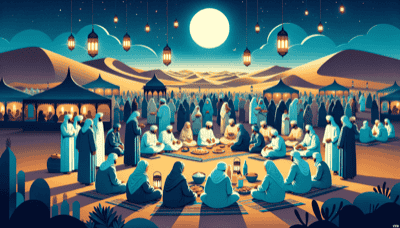We're here to help you keep count of the days to or since a date. Just click the button below and enter your chosen date to get started. Also choose the suggested days or search for a special day above #countingthedays

Eid al-Fitr, also known as the "Festival of Breaking the Fast," is one of the most significant Islamic holidays, celebrated by Muslims around the world, including Libya. It marks the end of Ramadan, the holy month of fasting.
The history of Eid al-Fitr dates back to 624 CE when Prophet Muhammad received revelations from Allah that formed the Quran. The festival was established by Prophet Muhammad and has been celebrated by Muslims ever since.
In Libya, as in many Muslim-majority countries, Eid al-Fitr begins with a special prayer known as Salat al-Eid which is performed in congregation in mosques or open spaces called musallas. Before attending the prayer, it is customary for individuals to perform ghusl, a full-body purification ritual.
Libyans wear new clothes and often start their day by eating small sweets or dates before heading to the prayer ground. This signifies breaking their fast from dawn to sunset that they adhered to during Ramadan.
After prayers, people exchange greetings such as "Eid Mubarak" (Blessed Eid) or "Eid Sa‘eed" (Happy Eid). Families and friends visit each other's homes and share meals—especially lunch—which often include traditional Libyan dishes like couscous, bazeen, or lamb-based dishes.
Charity (Zakat al-Fitr) is an important aspect of Eid in Libya. It involves giving to those in need before the Eid prayers so that everyone can enjoy the day. Children often receive gifts or money, known as Eidiyah, from elder family members.
During this time, towns and cities across Libya are decorated with lights and decorations. Public areas are bustling with festive spirit where children play with toys like balloons or sparklers, and sweets like baklava are enjoyed.
Cultural Performances: Traditional music and dance might be performed in some communities to celebrate this joyous occasion.
Despite regional differences across Libya due to tribal traditions and local customs, Eid al-Fitr remains a time for forgiveness, celebration, social harmony, and unity among all Libyans.